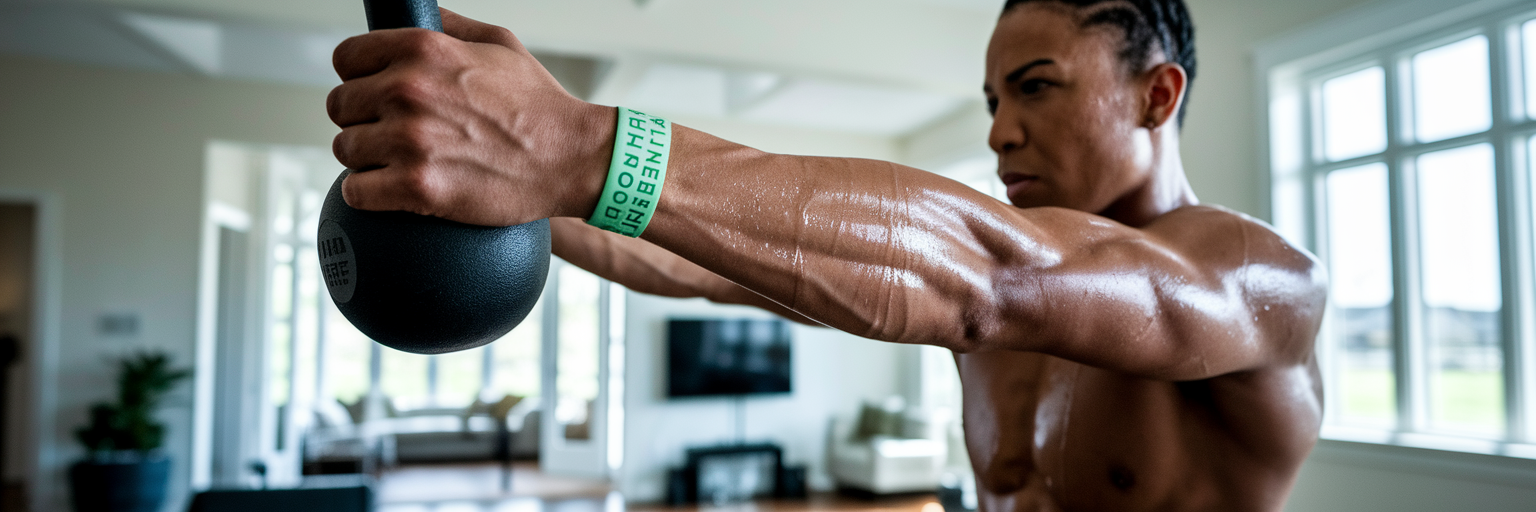Understanding Creatine and Its Role in a Vegan Diet
Think of creatine monohydrate as a battery recharger for your muscles. During short, intense activities like sprinting or lifting weights, your muscles use a high-energy molecule called ATP. Creatine helps rapidly replenish this energy, allowing you to push out that extra rep or finish a sprint with more power. It’s one of the most studied and effective tools for improving performance.
So, why is this especially relevant for those on a vegan diet? Creatine is naturally found in animal tissues, which means vegans and vegetarians typically have lower creatine stores in their muscles compared to meat-eaters. But this isn't a disadvantage. In fact, it’s a unique opportunity. Because your muscles aren't already saturated, you're likely to experience a more noticeable and significant performance boost from supplementation.
While your body does produce a small amount of creatine on its own from amino acids, it’s generally not enough to fully optimize your athletic output. This makes supplementation one of the most effective strategies for dedicated vegan athletes looking to enhance their training with plant based muscle growth supplements. By bridging this small dietary gap, you can unlock new levels of strength and endurance, and you can learn more about the foundational creatine benefits we've detailed before.
Myth 1: Creatine Isn't Actually Vegan

This is probably the most common question we hear, and it’s a logical one. If creatine is found in meat, it makes sense to assume that supplements must come from animal sources, too. But here’s the good news: that assumption is outdated. Today, virtually all high-quality creatine monohydrate is synthetically produced in a laboratory.
The process involves combining two simple, non-animal compounds called sarcosine and cyanamide. This reaction takes place in a controlled, sterile environment, resulting in a pure creatine powder that is completely free of any animal byproducts. It’s a clean and efficient method that ensures consistency and safety.
Think of it like Vitamin B12 supplements. B12 is also difficult to get on a vegan diet, and most supplements are created through a lab-based process using bacterial fermentation, not animal sources. Creatine production follows a similar principle. To be absolutely sure, you can always look for a "Certified Vegan" logo or a clear statement on the packaging. For example, our pure Creatine Monohydrate is proudly vegan-friendly, giving you the performance benefits without compromising your values. This makes it a fantastic tool for any creatine for vegan athletes.
Myth 2: Creatine Is Unsafe and Harms Your Kidneys
Let's talk about the biggest concern people have: the idea that creatine is bad for your kidneys. This myth has been circulating for years, but it’s time to set the record straight with science. The overwhelming scientific consensus is that for healthy individuals, creatine is exceptionally safe.
So where did the myth come from? It stems from a misunderstanding of how kidney function is measured. When you supplement with creatine, it can slightly increase the levels of a waste product called creatinine in your blood. Since doctors use creatinine levels to test for kidney issues, this small, expected increase was once misinterpreted as a sign of damage. However, extensive research has shown this is a harmless and predictable byproduct of creatine metabolism, not an indicator of kidney strain. A comprehensive review published in the Journal of the International Society of Sports Nutrition confirms that long-term supplementation at recommended doses does not harm kidney function in healthy people. The Mayo Clinic also notes that when used appropriately, creatine is considered safe for most people.
The key question, is creatine safe for vegans, gets a resounding yes from the scientific community. Of course, if you have a pre-existing kidney condition, it is always wise to speak with your doctor before starting any new supplement. But for the vast majority of us, creatine remains one of the most researched and trusted supplements on the market.
| Common Myth | The Scientific Truth | Key Takeaway for Vegans |
|---|---|---|
| Creatine damages your kidneys. | Extensive research, like a study highlighted by the National Center for Biotechnology Information, shows no harm to healthy kidneys at recommended doses (3-5g/day). | It's safe for healthy individuals; the myth comes from a misunderstanding of blood markers. |
| Creatine is an unnatural steroid. | Creatine is a natural compound made from amino acids, not a hormone or steroid. | It's a natural energy source for muscles, not a synthetic performance-enhancing drug. |
| You'll lose all your gains if you stop. | You may lose some water weight, but the strength and muscle built through harder training are yours to keep. | Creatine helps you build real strength, which doesn't disappear when you cycle off. |
Note: This table summarizes findings from decades of sports nutrition research. The safety data is based on studies of individuals with healthy kidney function.
Real Performance and Health Gains for Vegan Athletes

Now that we’ve cleared up the myths, let’s focus on the exciting part: the real-world results. The vegan creatine benefits go beyond just one area, supporting your fitness goals from multiple angles.
More Strength and Power in the Gym
This is creatine’s most famous benefit. By recharging your muscle's energy systems, it directly translates to better performance. You might find you can squeeze out one or two more reps on your heavy sets or maintain your power through the end of a high-intensity workout. This added work capacity is what stimulates real strength gains over time.
Enhanced Lean Muscle Growth
Creatine supports muscle growth in two key ways. First, by helping you train harder, it provides a greater stimulus for your muscles to adapt and grow. Second, it draws water into your muscle cells, a process called cell volumization. This not only gives your muscles a fuller look but may also trigger anabolic, or muscle-building, signals. It's a powerful complement to a solid training and nutrition plan, especially when paired with delicious, high-protein meals like the ones in our favorite vegan protein recipes.
Faster Workout Recovery
Feeling less sore between sessions means you can train more consistently and effectively. Research suggests creatine can help reduce muscle damage and inflammation following intense exercise. This means you can get back to your workouts sooner, feeling stronger and more prepared to give your best effort again.
A Surprising Boost for Your Brain
Here’s a fantastic bonus. Your brain, just like your muscles, requires a lot of energy to function. Studies are now showing that creatine supplementation can support cognitive functions like memory and mental processing speed. For vegans who don’t get creatine from their diet, this cognitive edge can be another welcome benefit.
These advantages make it an excellent choice for anyone, and it's often considered the best creatine for women vegan or otherwise, due to its proven safety and effectiveness without hormonal impact.
A Practical Guide to Choosing and Using Creatine
Ready to give it a try? Getting started is simple. Here’s a straightforward guide on how to choose creatine monohydrate and make it a seamless part of your routine.
- Stick with the Gold Standard: Don't get distracted by fancy, expensive alternatives. Pure creatine monohydrate is the most researched, effective, and affordable form available. It’s the one that all the major studies are based on, and it’s all you need.
- Prioritize Purity: Look for products that are third-party tested. Certifications from organizations like NSF or Informed-Sport mean the supplement has been independently verified for purity and is free from contaminants and banned substances. This is your guarantee of quality.
- Keep Dosing Simple: The standard, effective dose is 3-5 grams per day. You can take it anytime that’s convenient for you. Some people do an initial "loading phase" of 20 grams per day for a week to saturate their muscles faster, but it’s completely optional. Consistent daily use will get you the same results over a few weeks.
- Make it a Habit: The easiest way to stay consistent is to incorporate it into your existing routine. Since most creatine monohydrate is unflavored, you can easily mix it into your post-workout protein shake, a smoothie, or even a glass of juice. Taking it with a source of carbohydrates can slightly enhance absorption.
Once you know what to look for, you can confidently explore trusted options in our curated collection of supplements to find the perfect fit for your fitness journey.
Your New Fitness Ally
Let’s recap. Creatine is completely vegan-friendly, proven safe for healthy individuals, and incredibly effective for boosting performance. It’s a simple tool that helps you train harder, build more strength, recover faster, and even gives your brain a little boost—all while perfectly aligning with your plant-based lifestyle.
Think of it not just as a supplement, but as a trusted ally in your fitness journey. It works with your body to help you achieve the goals you’re already working so hard for. For more insights on vegan fitness and nutrition, feel free to explore our blog.
Know a fellow vegan athlete who could use this info? Share this article and help spread the truth!



